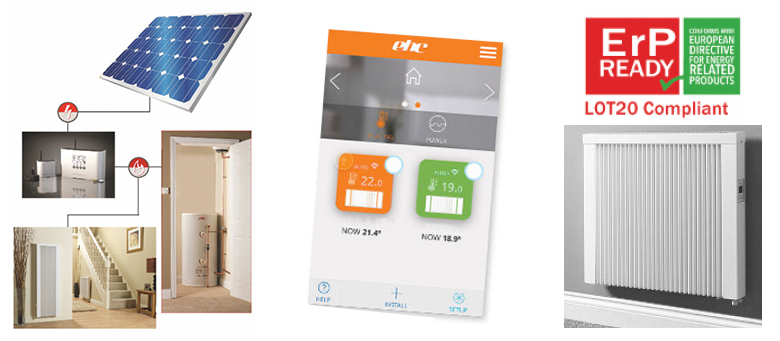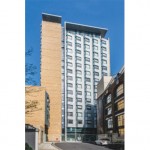A new era for Electric Heating
Some recent regulation and technology developments could signal a new era for Electric Heating. Innovative Electric Heating and Hot Water experts, The Electric Heating Company, explore these developments and how Schools, Offices and Public Buildings could benefit.
The common perception of Electric Heating is that it comprises ageing electric storage heaters which are expensive to run, often difficult to control and provide a poor heating experience. However, a new regulation and technology developments provide further evidence that this perception could not be further from the truth. The Electric Heating Company (“EHC”) have long been advocates of modern electric heating systems and welcome this new regulation and technology developments.
A new energy efficiency standard, ‘LOT 20,’ technology developments relating to demand side response management and improvements in the combination of electric heating and Renewables all show that electric heating should not be discounted as a heating solution for your School or Property.
New ‘LOT 20’ Energy Efficiency Standards
On the 1st January 2018, a new regulation affecting “the ecodesign requirements for local space heaters” became effective. This derives from an EU Commission Regulation transposed into UK Law under the Energy Related Products Regulations (ERP). This new regulation is often referred to as ‘LOT 20’ and requires any new local space heating system installed from this date onwards to be compliant with set energy efficiency standards.
The aim of LOT 20 is to reduce the energy consumption through accurate management and control of electric heating appliances and minimise wasted energy. To meet the objectives of LOT 20, better use of intelligent timers, controls and sensors must be made. Standard on/off heating appliances without such controls will no longer be compliant and manufacturers and distributors will no longer be able to sell these.
Any new local space heating system installed from 1 January 2018 onwards must be compliant with the new LOT 20 performance standards. The legislation is not retrospective, so existing systems in place will not be affected.
To be LOT 20 compliant, heaters will in general now need to include 3 key features:
- 24/7 time and temperature control, either built in or through wireless/WIFI APP.
- Electronic thermostatic control for accurate room temperature measurement.
- Open window/door recognition so the heater can reduce usage if the user leaves a door or window open reducing the room temperature rapidly. Some radiators will have a have a smart start facility included, which allows the heater to choose the time it engages to bring the room up to the required temperature set by the user.
All heaters must also meet a minimum seasonal space heating energy efficiency requirement too.
This new regulation change is welcomed by EHC and will stop basic static storage heaters and electric panel heaters with basic manual controls from being available for sale. All new electric heating systems will be fully controllable 24/7 for time and temperature purposes. Furthermore, advanced technology like open window sensors should reduce consumption when windows or doors are left open.
EHC have been well prepared for this new regulation. The EHC DSR Electric Combination Radiators, an update to the EHC Combination Radiators which have proven very popular in many Schools across the UK, have been LOT 20 compliant since January 2017. This range of LOT 20 compliant radiators continue to offer full controllability, ease of operation and, on the correct electricity tariff, continue to be affordable to run. Through a central programmer School Janitors will still be able to control the time and temperature of the whole heating system to suit the School.
Room thermostats and individual radiator controls also allow Teachers to control individual classroom temperatures.
Demand Side Response Technology
Demand Side Response (“DSR”) is about the use of electricity, rather than how it is generated, and promotes the smart use of energy to shift demand for electricity in real time. DSR technology can reduce peaks in demand when National Grid might struggle to supply and reward for consumption in off peak periods. DSR is now widely accepted as a smart way for Large Businesses to reduce their total energy costs and reduce their carbon footprint. Over the past few years, DSR technology has been developing rapidly and is now ready for implementation on a smaller scale.
EHC have been closely monitoring advances in DSR technology and over the past 18 months have developed their own solution; the DSR Electric Combination Radiator. Through a Smart WiFi DSR Control System, a Consumer can control the time and temperature settings of up to 30 radiators anytime and anywhere. The special features of the DSR system also allow the Consumer to limit electricity consumption to avoid exceeding the maximum power available or to limit consumption in peak periods when electricity tariffs are at their most expensive.
EHC are expanding this DSR Control System and are currently trialling the ability of this DSR Control System to respond to external signals for frequency response and time of use tariff purposes. This will allow groups of DSR Electric Combination Radiators, potentially thousands at a time, to have their consumption reduced or turned off for a short period of time by an Aggregator. This may be required if frequency problems are detected on the Grid or if Power Companies introduce time of use tariffs which make it expensive to consume in times of peak demand.
Further, Power Companies may offer Renewable led electricity tariffs which provide Consumers with cheaper electricity if they consume when Renewable generation is prevalent. Being able to respond to these requirements will reduce electricity costs for Consumers as frequency response payments or cheaper time of use tariffs are made available.
The DSR Electric Combination Radiator has an element of in built heat storage as a result of the magmatic tablets at the core of the radiator. This, therefore, should ensure there is no compromise to the heating provided for Consumers when their heating is turned down or off through the DSR Control System.
This DSR Control System provides further evidence that electric heating is a developing technology and becoming an even more affordable form of heating. As Schools often have large heat requirements, the benefits a DSR electric heating system could provide will be even greater.
Solar PV Secondary Heating
In early 2016 EHC were approached by several Consumers who installed Solar PV arrays across a range of properties. These Consumers were mindful of the reduction in Feed in Tariff and wanted to increase their utilisation of the Solar PV generation to achieve greater cost savings. They asked if EHC could provide a cost effective solution which could increase PV self-consumption and provide ‘free’ heating for their Properties. Specifically, some wanted to provide additional ‘free’ heating for Tenants who are elderly or fuel poor.
To assist these Consumers, EHC designed a Solution that utilised Solar PV Ready Radiators working in conjunction with an Intelligent Controller. This ensured that the Property is using all of the Solar PV energy being generated and minimising what generation is sent back to the Grid. The system will operate in a manner that the feed in tariff received for generation is not affected and can still be received by the appropriate party.
The Solar PV Ready Radiators have a ceramic core which benefit from partial storage and can operate from as low as a small trickle of current being fed to them up to the full current required to heat the radiator to its maximum output. The Intelligent Controller ensures the Property’s power demand e.g. for lighting, the kettle, vacuum cleaner, television etc. is met first by the Solar PV generation and only the excess PV generation not otherwise utilised is sent to the Solar PV Ready Radiators. The Intelligent Controller can also operate with a Hot Water Cylinder should the preference be to divert heat to the Property’s Hot Water Cylinder during the summer months.
The intention of these Solar PV Ready Radiators is not to provide a whole heating system for a property but to provide a background heat during the day or provide heat to rooms which are not normally heated e.g. storage cupboards, small classes, meeting rooms or offices.
To prove this Solar PV Secondary Heating system can provide benefits and costs savings, EHC ran comprehensive trials of the system over a 12 month period in 27 properties. EHC chose an independent third party specialist, Delta EE, to monitor and analyse the Trial results.
The final Trial results proved to be significantly better than any prior predictions made by Delta EE. The Trial results achieved were:
- The Solution increased PV self-consumption on average by 42%
- Average estimated Annual Bill Savings of £42 for properties with Gas Central Heating and £185 for properties with all Electric Heating
- Average estimated CO2 Savings of 199kg for properties with Gas Central Heating and 868kg for properties with all Electric Heating
- Average room temperature increase of 3°C in rooms fitted
The stand out result, however, has been the Consumer feedback received. All Consumers who participated in the Trials found the Solution a benefit and that it ‘makes sense for others to use.’ Specifically, some commented the difference in room temperatures was noticeable and rooms not previously heated were now ‘a pleasant temperature.’ Some also commented that the financial savings ‘will continue to increase if Energy Tariffs continue to rise.’
With these great results and positive Tenant feedback, EHC hope this Solution will be given credence by the UK Government in the Standard Assessment Procedure (SAP) Regulations.
This Solar PV Secondary Heating System would ensure that Schools and other Buildings with Solar PV arrays installed maximise their PV self-consumption. The Solar PV Ready Radiators would provide additional heat during the day for hard to heat rooms and provide cost and CO2 savings.









Leave a Reply
Want to join the discussion?Feel free to contribute!